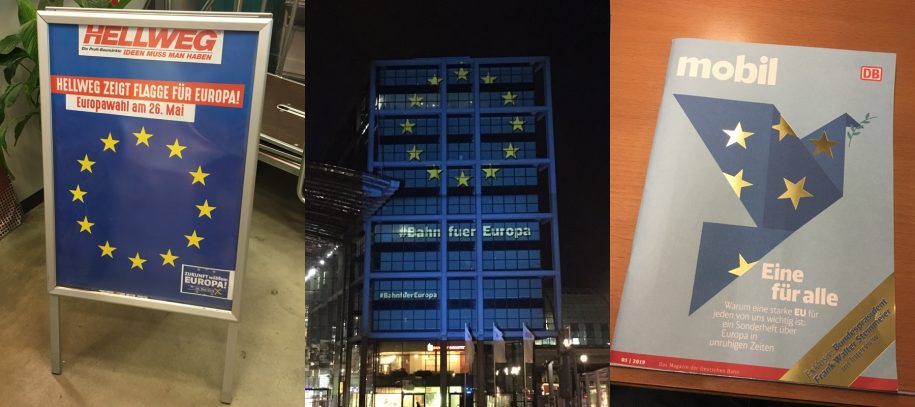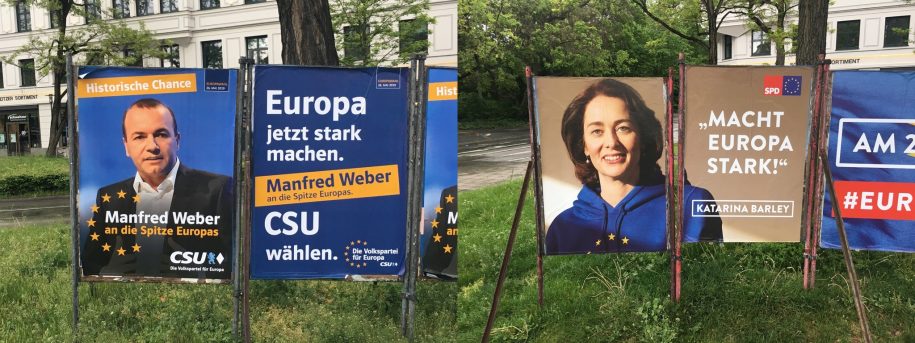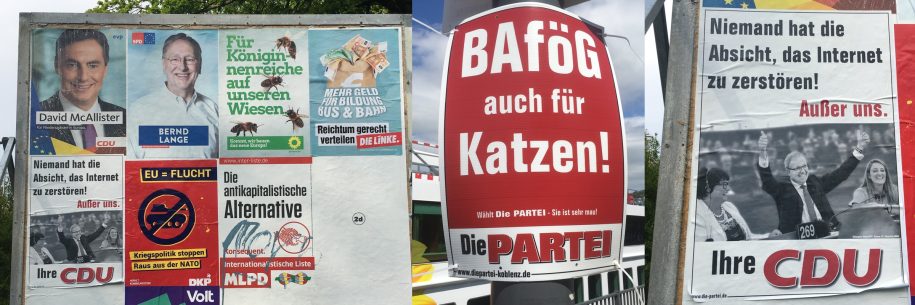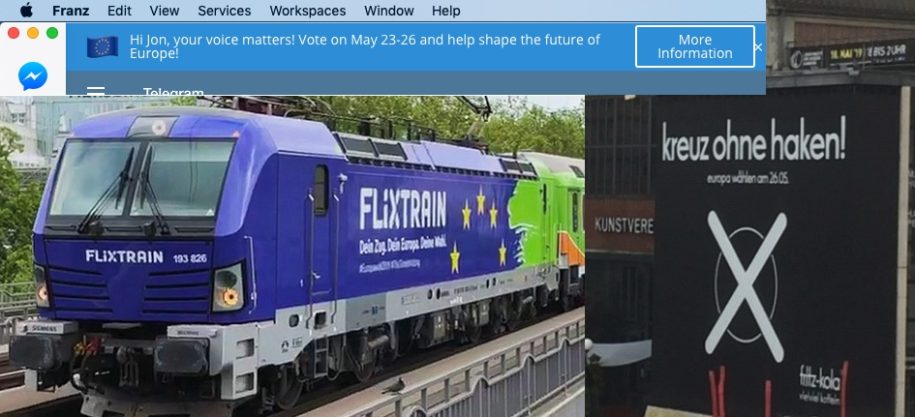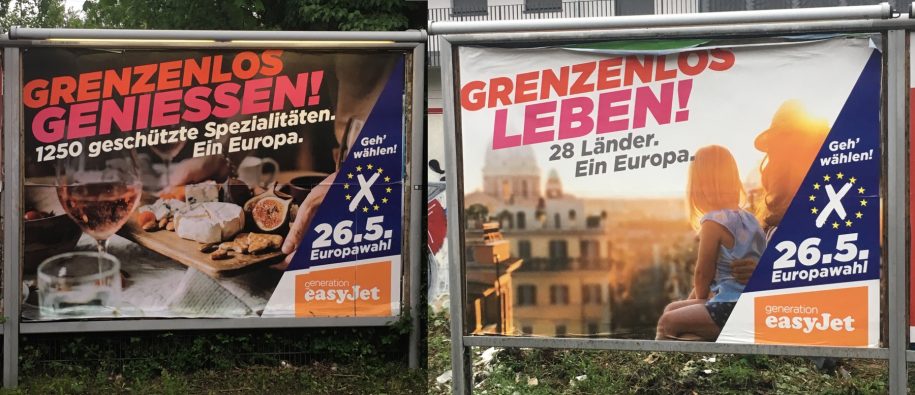In Germany everyone cares about the EU, but not really about the European Parliament election
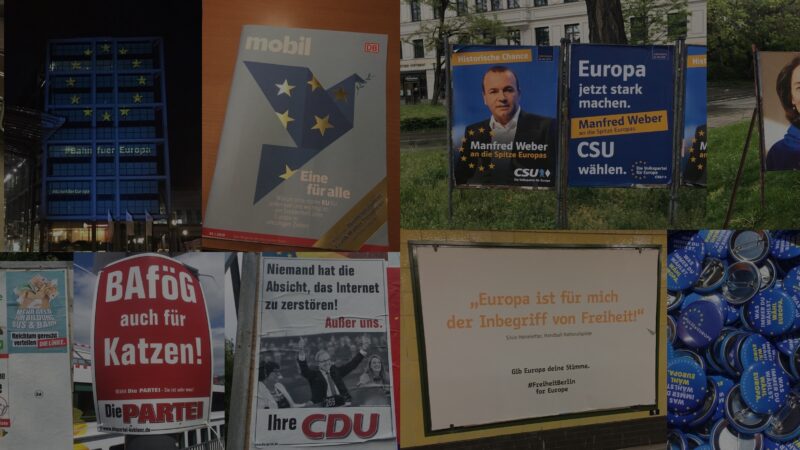
A short while ago I needed to buy a plant pot so headed off to my local Hellweg DIY store. And EU flag was fluttering in front of the building, and placards inside told me “Hellweg zeigt Flagge für Europa!” (Hellweg is showing the flag for Europe!)
Arriving back home in Berlin on 6th May, DB was projecting an EU flag onto Berlin main station. There was even a sort of hashtag campaign (#BahnFuerEuropa), a locomotive decorated for the campaign, and an edition of the DB magazine was dedicated to the EU too. Now if only DB actually provided better cross border connections for passengers… but that’s another issue. Meanwhile less green friends of mine were happy to see a similar campaign from Lufthansa.
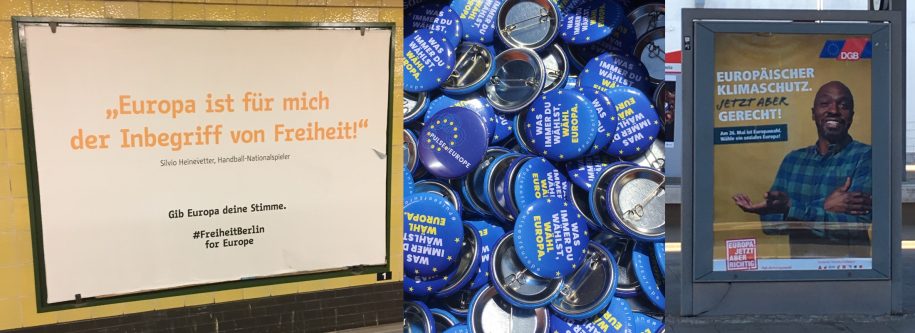
(l) poster at Hermannplatz U-Bahn Berlin, (m) badges at Pulse of Europe Potsdam, (r) DGB poster at Kaiserslautern Hbf
Meanwhile all across Germany there are initiatives about EU politics. From the flag wavers of Pulse of Europe through to posters from the DGB (trade union confederation) to a variety of poster campaigns in railway stations, you cannot avoid noticing that this EP election is happening. Even the voting app Wahl-o-Mat was being advertised on LCD screens at Südkreuz station in Berlin.
But what of the actual election campaign itself?
Sometimes you need an outsider to point out the problems. Benedict Neff of the Swiss newspaper Neue Zürcher Zeitung wrote an article entitled “Anstatt einen Wahlkampf zu führen, zelebrieren die deutschen Parteien die Europäische Union” (Instead of conducting an election campaign, the German parties celebrate the European Union). “Ideen für die Zukunft spielen dabei kaum eine Rolle” (Ideas for the future hardly play a role) he continues.
Meanwhile an election slogan only makes any sense if anyone could actually disagree with it. And even worse is when the parties that are supposed to be opponents use almost identical empty slogans. Always to the point, the satirical website Der Postillon wrote “Parteien fassungslos: Wahlplakate von Unbekannten durch inhaltsleere Nonsens-Poster ersetzt” (Parties stunned: strangers replace election posters with empty nonsense posters).
The satirical party Die Partei has also been doing its bit – by putting up actual nonsense (BAföG auch für Katzen – Student loans also for cats) and an icy critique of Axel Voss MEP and the CDU’s reform of digital copyright in Brussels.
So if the content is not compelling, how about the people running? Is personalisation a way forward?
It seems that does not work either.
The majority of the German population does not know any of the candidates running. Die Welt summarises a poll about the top candidates – the AfD’s Meuthen is the best known as he is Parteivorsitzender of that party. Despite Barley’s face appearing on pretty much every SPD EP election poster across the whole country only a third of Germans know who she is. Weber is not only the CSU top candidate, but is the EPP’s EU-wide Spitzenkandidat but is known by only a quarter of Germans. There was more interest (and more posters) featuring Jean Claude Juncker in 2014 than there are with Weber this time! (Although this might be because Schulz at least brought some energy to the SPD’s 2014 campaign). Ratings for the candidates of FDP, Die Linke and Greens candidates are even worse.
All of this gives the impression of an election campaign that’s rather flat, rather lacking in spark and controversy.
Perhaps the heart of it is that all the parties see little to gain in this election (summary of polls here). The CDU have not received the boost in the polls they hoped for when AKK replaced Merkel as party leader – they are still at around the 30% mark, and down on their result in 2014. The SPD is putting money and effort into the EP election campaign, but is polling at 15% – the party is showing no signs of recovery. The Greens will do well in comparison to 2014 (up to 16% from 10%), but the result will not match the major gains in Bavaria and Hessen last year. The FDP has been flatlining at around 7% since Lindner flounced out of coalition talks 18 months ago. Die Linke can’t make up its mind whether it is pro-EU or not. And while AfD will go up from 7% in 2014 to about 12% this time, that is a hit in comparison to how they have been performing in Land elections.
I have been doing my bit locally for the Greens here in Kreuzberg, but we have less than 20% of the resources available for this election campaign in comparison to a Bundestag campaign, so I suppose it is no surprise that it all feels flat. When you have very little in terms of resources it is hard to organise a compelling and dynamic election campaign. I assume other parties face the same constraints.
In Germany it feels like everyone cares about the EU, but not really very much about the European Parliament election.
[UPDATE 21.5.2019, 1045]
Manuel Müller and @kirschly have pointed me towards this article in Die Zeit that shows 10% more of the German population saying they are interested in the election than they were in 2014. The poll nevertheless does not try to separate out interest in the EU from interest in the election, so I am not sure what conclusion to draw from it.
[UPDATE 22.5.2019, 1220]
This excellent Twitter thread from Reinhard Hönighaus makes a similar point to this blog post.
[UPDATE 23.5.2019, 1200]
A few more examples from the past few days…
Source of the Flixtrain pic – RailColorNews here. Meanwhile Deutsche Bahn has taken its campaign top Brussels, and even got the European Commission to tweet about it. Franz is a free messenger app for Mac, coded in Austria – perhaps a little off topic but interesting nevertheless.
And meanwhile EasyJet is at it as well…
